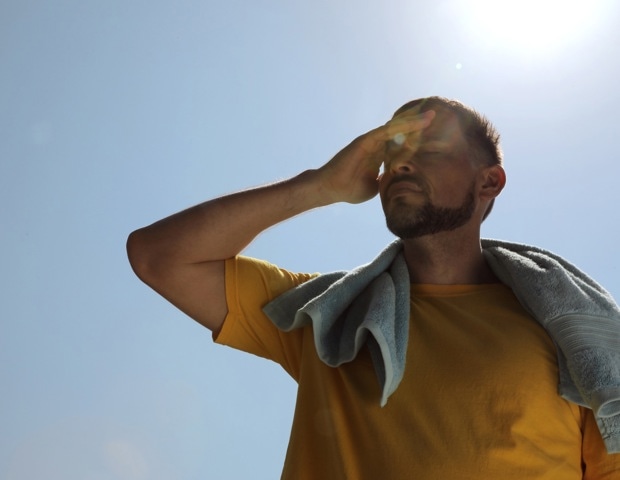
With NASA knowledge exhibiting that July 22, 2024, was the most well liked day on report and indications that July could have been the most well liked month, an Annenberg Public Coverage Middle survey carried out in mid-July discovered that most individuals know three of the signs of a heat-related sickness however have no idea the situation of their nearest cooling heart. On the identical time, growing numbers of individuals suppose that warmth waves have gotten extra frequent and intense and affecting their day by day actions.
Information of cooling facilities within the case of utmost warmth
Though the areas of cooling facilities, or indoor air-conditioned services resembling libraries, neighborhood and senior facilities, colleges are publicized by metropolis governments on scorching days, lots of these surveyed report being unaware of the place to seek out one. Two-thirds of respondents (67%) say they have no idea the situation of a cooling heart to which they may go to in case of utmost warmth, a quantity statistically unchanged from final November. “Communities should do a greater job of constructing the general public, particularly essentially the most weak, conscious of those facilities,” mentioned Ken Winneg, managing director of survey analysis at APPC.
Extra in the present day see hyperlink between excessive warmth and local weather change.
Compared with an APPC survey in November 2023, considerably extra individuals now say that local weather change is growing the chance of heat-related sicknesses, respiratory ailments, and insect-borne ailments. Two-thirds (67%) maintain this view vs. slightly below 6 in 10 (58%) in November 2023.
Extra individuals point out that warmth waves in the US have gotten extra frequent and intense than prior to now. About two-thirds (65%) imagine warmth waves have gotten extra frequent and intense. Fifty-eight p.c (58%) felt this fashion in November 2023, after we final requested the query. A few quarter (24%) imagine warmth waves are about as frequent and intense as they’ve all the time been, statistically unchanged from our earlier survey.
On the identical time, the proportion of people that say excessive warmth has typically or steadily affected their typical day by day actions prior to now 12 months has elevated considerably. Forty-three p.c (43%) say excessive out of doors warmth has typically (22%) or steadily (21%) affected their day by day actions, an 8-point enhance in contrast with November 2023 (35% in whole mentioned both “typically” or “steadily”).
Indicators of heat-related sicknesses
Notably, most individuals additionally know three of the telltale indicators of heat-related sicknesses:
- Dizziness (89% in comparison with 86% in August 2022)
- Nausea (83% in comparison with 79% in August 2022)
- Scorching, purple, dry, or damp pores and skin (72%, statistically unchanged from August 2022)
- Chilly, pale, and clammy pores and skin (42%, statistically unchanged from August 2022).
Public understands some excessive warmth dangers higher than others
Interested by the following 10 years, slightly below 6 in 10 (58%) suppose that folks of their neighborhood might be extra prone to expertise warmth stroke brought on by excessive warmth waves. That is considerably increased than in November 2023 when simply over half (52%) mentioned they thought individuals of their neighborhood could be extra prone to expertise warmth stroke brought on by excessive warmth waves within the subsequent 10 years.
Nevertheless, solely 3 in 10 (30%) know {that a} pregnant particular person within the U.S. who’s uncovered to excessive warmth is extra prone to ship their child early than a pregnant one that will not be uncovered to excessive warmth. A few quarter (23%) incorrectly say {that a} pregnant particular person within the U.S. is both much less or simply as prone to ship a child early. Forty-seven p.c (47%) are not sure which is right.
Broad consciousness that heat-related deaths are most typical amongst seniors
Two-thirds (67%) know that heat-related deaths are most typical amongst older adults, aged 65 or older, barely however considerably increased than in August 2022 (62%).
Stopping heat-related sicknesses
Practically all (92%) know that ingesting water is best to stop heat-related sicknesses than ingesting sugary drinks.
APPC’s ASAPH survey
The survey knowledge come from the 20th wave of a nationally consultant panel of 1,496 U.S. adults, first empaneled in April 2021, carried out for the Annenberg Public Coverage Middle by SSRS, an impartial market analysis firm. This wave of the Annenberg Science and Public Well being Information (ASAPH) survey was fielded July 11-18, 2024, and has a margin of sampling error (MOE) of ± 3.6 proportion factors on the 95% confidence stage. All figures are rounded to the closest entire quantity and should not add to 100%. Mixed subcategories could not add to totals within the topline and textual content as a result of rounding.
